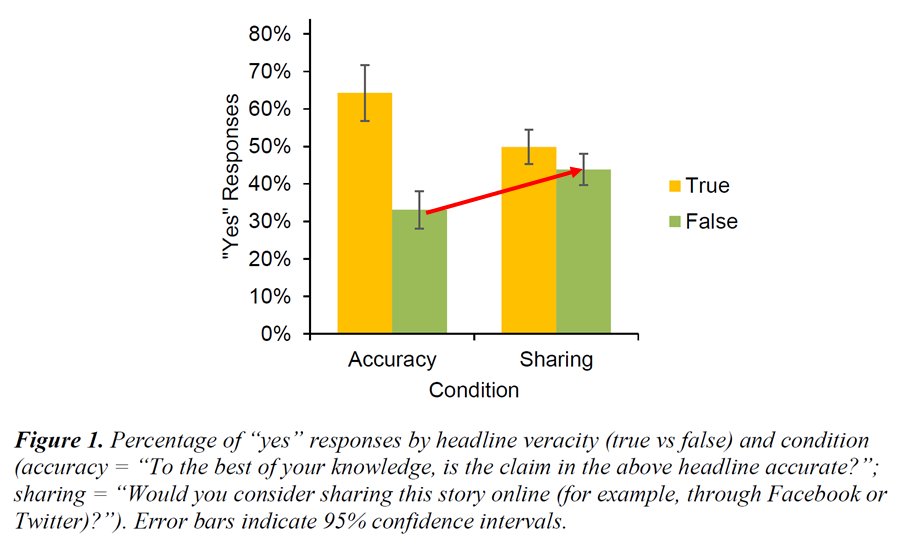Our paper "Fighting COVID-19 misinformation on social media: Experimental evidence for a scalable accuracy nudge intervention" is now in press at Psych Science!
I’m super proud of this paper - but first, a thread on the results.
Preprint: http://psyarxiv.com/uhbk9/
I’m super proud of this paper - but first, a thread on the results.
Preprint: http://psyarxiv.com/uhbk9/
Actually, let's start with a different but first:
Please consider signing up for this: https://twitter.com/SocietySpark/status/1269975280128589826?s=20
Please consider signing up for this: https://twitter.com/SocietySpark/status/1269975280128589826?s=20
Okay, back to the thread:
A key question is why people share misinformation on social media in the first place. If we can understand this, we might be able to develop interventions to slow it down. This becomes increasingly important in the context of a global pandemic.
A key question is why people share misinformation on social media in the first place. If we can understand this, we might be able to develop interventions to slow it down. This becomes increasingly important in the context of a global pandemic.
Consistent with past work ( http://psyarxiv.com/3n9u8 ), we find that people are fairly decent at distinguishing true from false (“fake news”) COVID-19 content. Note the big gap between true and false in terms of belief here (red arrow).
Unfortunately, though, this doesn’t seem to matter much for social media sharing intentions. ~32% of false headlines were believed in the accuracy condition… and ~45% of the *same false headlines* were shared in the sharing condition.
That is, people are saying that they would share content that they would likely be able to identify as being inaccurate *if they bothered to think about it*
We know from past work that people almost unilaterally *say* that they really care about only sharing accurate content. So it’s unlikely that most people endorse sharing things that they know to be false.
From http://psyarxiv.com/3n9u8
From http://psyarxiv.com/3n9u8
We think that the social media context may distract people from thinking about accuracy. If so, even subtle nudges (or "primes", choose your buzzword) that remind people about accuracy should improve the quality of news content that people share on social media
And (surprise!) we find evidence for precisely this! Rating the accuracy of a single headline (ostensibly as part of a pretest) improves the extent to which people discern between true and false COVID-19 content in sharing intentions
I.e., the extent to which people share relatively more true than false COVID-19 content increases if they are subtly prompted to consider accuracy. (Indeed, the difference between true and false more than doubled.)
I’m super proud of this paper b/c we were able to successfully translate a theoretically-driven intervention to address an important problem in the COVID-19 context. This was done rapidly, but we did not compromise on rigor (our primary analyses are preregistered, etc.).
A dumber reason why I’m proud of the paper because I’ve been getting rejected from Psych Science for 10 years or so. I’ve been doing work on the importance of analytic thinking for a while now and perhaps it was too “obvious” and not sufficiently surprising.
Our results might not particularly surprising, but I take that as a positive. It makes sense... so maybe it’s true! And, if it is, then our research suggests that social media companies can do more to fight misinformation!
We need to change the way that people interact with social media. But, until that big change happens, we can at least remind people to consider whether something is true before they share it. We’re working now on trying to optimize this (e.g., to avoid “banner blindness”).
And now, for those who are still reading, there are some additional (secondary) findings that may be of interest.
1) Cognitive reflection & science knowledge were associated with discernment for both accuracy & sharing (but much more strongly for the former than the latter).
2) Democrats were more likely to share COVID-19 content (both false & true, but more the latter). No diff for belief
2) Democrats were more likely to share COVID-19 content (both false & true, but more the latter). No diff for belief
Concern over COVID-19 was *negatively* correlated with cognitive reflection (other work found that CRT is nonetheless associated with lower misperceptions: https://psyarxiv.com/zhjkp/ ).
Strong correlation between COVID-19 concern & medical-maximizing (v minimizing) (c/o @ldscherer)
Strong correlation between COVID-19 concern & medical-maximizing (v minimizing) (c/o @ldscherer)
Okay, that's it! Super excited about this paper and happy to hear any and all feedback! Props to my research soulmate, @DG_Rand, and the rest of the team - @JonMcphetres, Yunhao Zhang, & Jackson Lu - for working so hard on this paper with me!
Thanks for reading!
Thanks for reading!

 Read on Twitter
Read on Twitter








